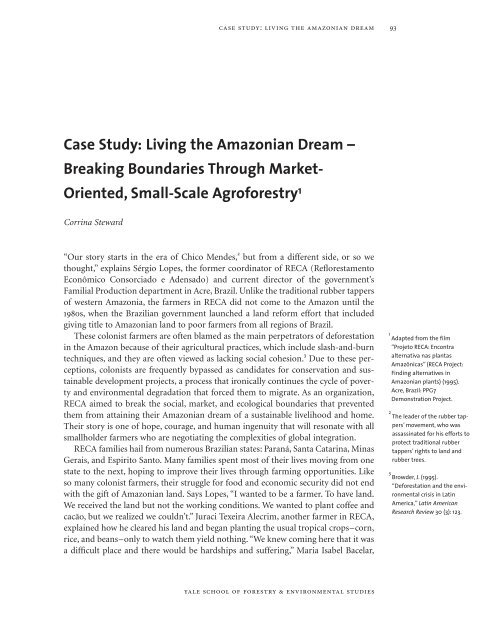Agroecology and the Struggle for Food Sovereignty ... - Yale University
Agroecology and the Struggle for Food Sovereignty ... - Yale University
Agroecology and the Struggle for Food Sovereignty ... - Yale University
You also want an ePaper? Increase the reach of your titles
YUMPU automatically turns print PDFs into web optimized ePapers that Google loves.
case study: living <strong>the</strong> amazonian dream<br />
93<br />
Case Study: Living <strong>the</strong> Amazonian Dream –<br />
Breaking Boundaries Through Market-<br />
Oriented, Small-Scale Agro<strong>for</strong>estry 1<br />
Corrina Steward<br />
“Our story starts in <strong>the</strong> era of Chico Mendes, 2<br />
but from a different side, or so we<br />
thought,” explains Sérgio Lopes, <strong>the</strong> <strong>for</strong>mer coordinator of RECA (Reflorestamento<br />
Econômico Consorciado e Adensado) <strong>and</strong> current director of <strong>the</strong> government’s<br />
Familial Production department in Acre, Brazil. Unlike <strong>the</strong> traditional rubber tappers<br />
of western Amazonia, <strong>the</strong> farmers in RECA did not come to <strong>the</strong> Amazon until <strong>the</strong><br />
1980s, when <strong>the</strong> Brazilian government launched a l<strong>and</strong> re<strong>for</strong>m ef<strong>for</strong>t that included<br />
giving title to Amazonian l<strong>and</strong> to poor farmers from all regions of Brazil.<br />
These colonist farmers are often blamed as <strong>the</strong> main perpetrators of de<strong>for</strong>estation<br />
in <strong>the</strong> Amazon because of <strong>the</strong>ir agricultural practices, which include slash-<strong>and</strong>-burn<br />
techniques, <strong>and</strong> <strong>the</strong>y are often viewed as lacking social cohesion. 3 Due to <strong>the</strong>se perceptions,<br />
colonists are frequently bypassed as c<strong>and</strong>idates <strong>for</strong> conservation <strong>and</strong> sustainable<br />
development projects, a process that ironically continues <strong>the</strong> cycle of poverty<br />
<strong>and</strong> environmental degradation that <strong>for</strong>ced <strong>the</strong>m to migrate. As an organization,<br />
RECA aimed to break <strong>the</strong> social, market, <strong>and</strong> ecological boundaries that prevented<br />
<strong>the</strong>m from attaining <strong>the</strong>ir Amazonian dream of a sustainable livelihood <strong>and</strong> home.<br />
Their story is one of hope, courage, <strong>and</strong> human ingenuity that will resonate with all<br />
smallholder farmers who are negotiating <strong>the</strong> complexities of global integration.<br />
RECA families hail from numerous Brazilian states: Paraná, Santa Catarina, Minas<br />
Gerais, <strong>and</strong> Espirito Santo. Many families spent most of <strong>the</strong>ir lives moving from one<br />
state to <strong>the</strong> next, hoping to improve <strong>the</strong>ir lives through farming opportunities. Like<br />
so many colonist farmers, <strong>the</strong>ir struggle <strong>for</strong> food <strong>and</strong> economic security did not end<br />
with <strong>the</strong> gift of Amazonian l<strong>and</strong>. Says Lopes, “I wanted to be a farmer. To have l<strong>and</strong>.<br />
We received <strong>the</strong> l<strong>and</strong> but not <strong>the</strong> working conditions. We wanted to plant coffee <strong>and</strong><br />
cacão, but we realized we couldn’t.” Juraci Texeira Alecrim, ano<strong>the</strong>r farmer in RECA,<br />
explained how he cleared his l<strong>and</strong> <strong>and</strong> began planting <strong>the</strong> usual tropical crops–corn,<br />
rice, <strong>and</strong> beans–only to watch <strong>the</strong>m yield nothing. “We knew coming here that it was<br />
a difficult place <strong>and</strong> <strong>the</strong>re would be hardships <strong>and</strong> suffering,” Maria Isabel Bacelar,<br />
1 Adapted from <strong>the</strong> film<br />
“Projeto RECA: Encontra<br />
alternativa nas plantas<br />
Amazônicas” (RECA Project:<br />
Finding alternatives in<br />
Amazonian plants) (1995).<br />
Acre, Brazil: PPG7<br />
Demonstration Project.<br />
2 The leader of <strong>the</strong> rubber tappers’<br />
movement, who was<br />
assassinated <strong>for</strong> his ef<strong>for</strong>ts to<br />
protect traditional rubber<br />
tappers’ rights to l<strong>and</strong> <strong>and</strong><br />
rubber trees.<br />
3 Browder, J. (1995).<br />
“De<strong>for</strong>estation <strong>and</strong> <strong>the</strong> environmental<br />
crisis in Latin<br />
America,” Latin American<br />
Research Review 30 (3): 123.<br />
yale school of <strong>for</strong>estry & environmental studies

















